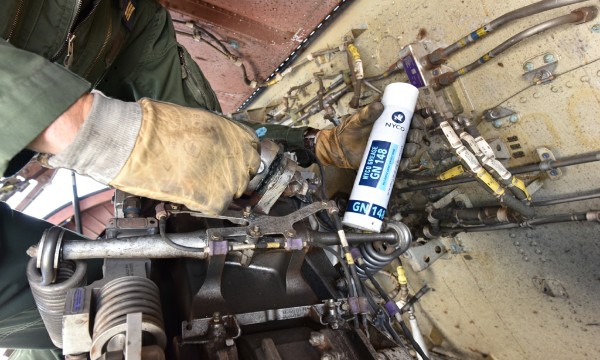MRO: NYCO focuses on rationalization of aviation lubricants |
| Interview by Romain Guillot |
|
|
18 OCT 2017 | 1157 words
|
 |
Lubrication task with NYCO GREASE © GN148. Picture Copyright NYCO |
|
|
|
NYCO, the French aviation lubricant specialist, is proposing multi-use grease for commercial aircraft maintenance. Le Journal de l'Aviation met Pedro Dasi, Program Development Head at NYCO, to find out more about the stakes involved in the rationalization of aviation lubricants by operators and MROs.
To which parts of the aircraft are multi-use greases applied?
For example, they are applied to flight controls, doors, actuators, cabin elements, for galleys, toilets and landing gear and generally to all bearings, especially on wheels. There are a lot of specifications when it comes to greases and each manufacturer has their own specs, and this is where we can rationalise things. The oil part is obviously very important, but it's a much simpler thing as there are only two different types of oil. The stakes is really for greases, and to a certain extent for hydraulic fluids.
How many separate lubricant references are there for each aircraft?
That depends on the manufacturer and on the aircraft type. For example, for the A320, there are 25 different grease references. This is related to the CML (Consumer Material List), a document approved by manufacturers, which uses codes to list all the lubricants approved. These codes are then called up in the maintenance tasks according to their applications. There are numerous different maintenance tasks, for each part of the plane, with codes which may be called up twice for the same task, or an alternative code may be used for the same task. So, an airline which hasn't chosen the same codes across the board can soon find itself with different greases around the aircraft. We can then help airlines to rationalise all these types of grease, both on the MRO side and on the operator side. For an A320, our multi-use grease can cover up to 90% of the volume of grease used. This helps to optimise supply and save time and money, but also to reduce the risks of human error. There is also a certain benefit for the environment, because when smaller quantities are purchased there is more waste as smaller containers are used.
This means that your grease is applied to much more equipment?
Exactly. We have carried out an inventory by analysing all aircraft documentation, the CML and the AMM. We will then try to push a grease which has been developed to cover a broad spectrum of applications so that it is referenced everywhere so that the airline can select it for all its maintenance tasks. First of all, this involves developing a grease which does everything, with very broad technology, but we also have to have it qualified by each manufacturer, for example at AIMS at Airbus (Airbus Industry Material Specification) and BMS at Boeing (Boeing Material Specification).
So a big part of your job today is to go see all aircraft manufacturers, for all types of aircraft, to qualify your multi-use grease on as many equipment as possible?
This is an important part of what we call the Program part at NYCO. We are in direct contact with aircraft and helicopters manufacturers, engine manufacturers and equipment providers. For the A320 family, a programme which has existed for decades, we need to qualify the new technology. However, for new aircraft programs, we have worked upstream to be able to propose this rationalization from the beginning. And this is much simpler, as we didn't need to study and re-qualify our multi-use grease. This is an overall objective for NYCO; to get involved upstream with manufacturers to integrate lubricants very early. One other complex factor is that our greases need to be qualified system by system, with manufacturer departments which don't necessarily speak to each other (flight controls, cabin). We then need to meet each manufacturer department to have the same grease qualified everywhere to ensure that there is a point to rationalization.
Is it easy to change grease for a given aircraft program?
That depends on the technology. Greases which use very recent technology enable us to rationalise everywhere, but they might not be compatible with very old greases, which have been qualified for around forty years. The parts need to be cleaned, but we then provide operators with a certain number of recommendations, which of course are approved by the constructor or the manufacturer of the equipment. However, if grease has the same technology, new grease simply needs to be added. In fact, the grease needs to meet two criteria: same specification and same technology. This is the concept of interchangeability and compatibility. Greases that have different technologies may be interchangeable, but they are not necessarily compatible. These are areas which we know very well.
Is this rationalization an asset for airlines which run mixed fleets?
Absolutely, although some airlines may not have had sufficient distance to see where they could rationalize, as they often refer to their maintenance management system history. We help them by providing a list of references and we also have the advantage of being able to implement the list in their system.
Are MROs also interested?
We talked about mixed fleets, but for a MRO operator with the capacity to intervene on a large number of different types of aircraft or equipment, there is also, and above all, a great interest in the rationalization of greases. One other issue is that certain airlines ask their maintenance suppliers to use a particular type of lubricant. We go further in this case as we make direct contact with the MROs who are present on all types of aircraft (Airbus, Boeing, Bombardier, Embraer, etc.). They are also able to convince their customers to use multi-use greases.
Today, much of the worldwide fleet is leased. Do leasing companies also decide on the choice of lubricants?
Leasing companies don't have much power when it comes to lubricants, except perhaps under certain conditions specific to engine oil. Greases are much more the domain of operators, who have total freedom to use the lubricants they want, as long as they are authorised by the manufacturer. An airline can then change lubricant without the lessor's agreement.
What about other greases which are not covered by NYCO's multi-use solutions?
These are old technology greases where we are also present. We think that we also have better solutions to propose. We could see improvements in maintenance, for example with longer maintenance intervals. These greases are much more durable and can provide even better protection for equipment against corrosion. Take a grease for wheel bearings, which has been designed for a specific number of cycles. With the improvement in tyre technology, we can imagine that one day this grease will become a limiting factor. So, we have developed a new grease which will be able to keep up with the developments in tyres and the reduced number of their replacements. |
|
 |
Romain Guillot
Chief editor
Cofounder of Journal de l'Aviation and Alertavia
|
|
| |
They made this section possible |
|
|
|
|
|
|
|
|
|
|
|
|
|
|
|
|
Top stories |
|
|
|
|
|
Top stories
|